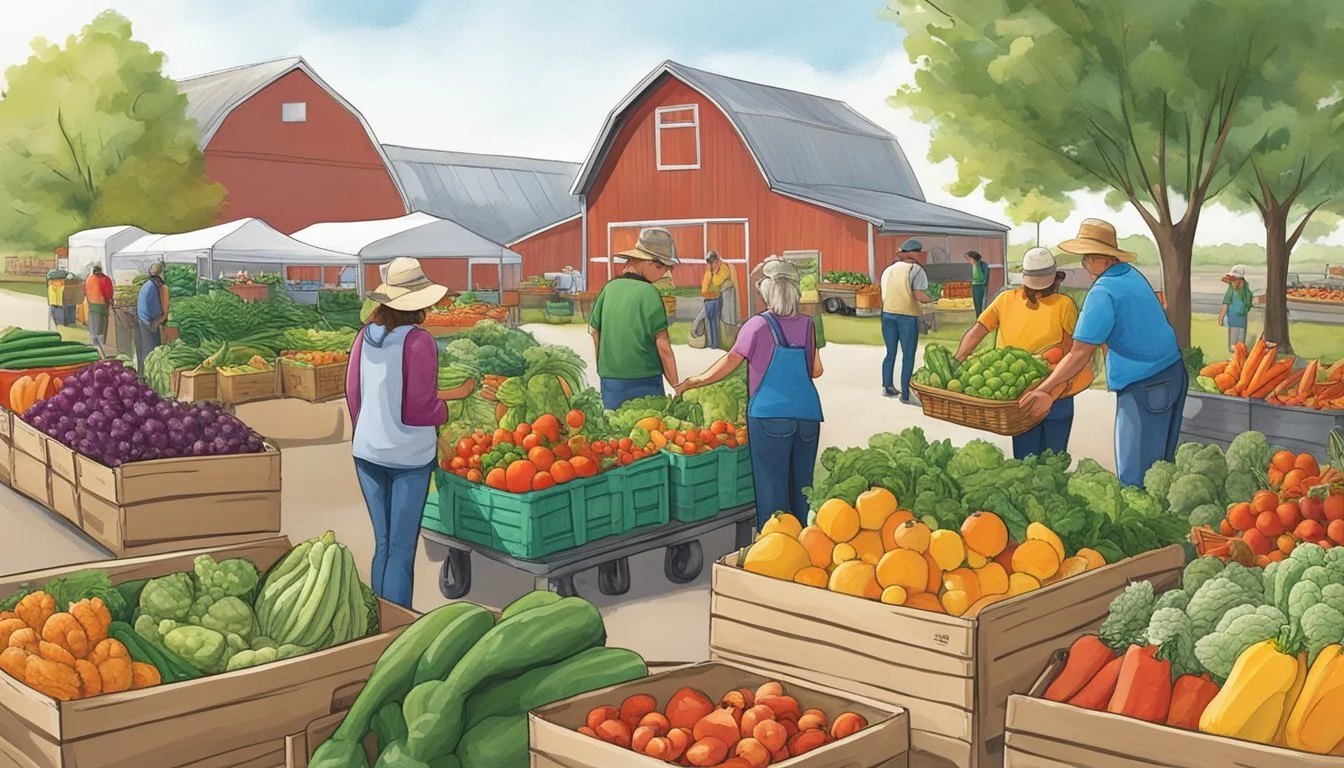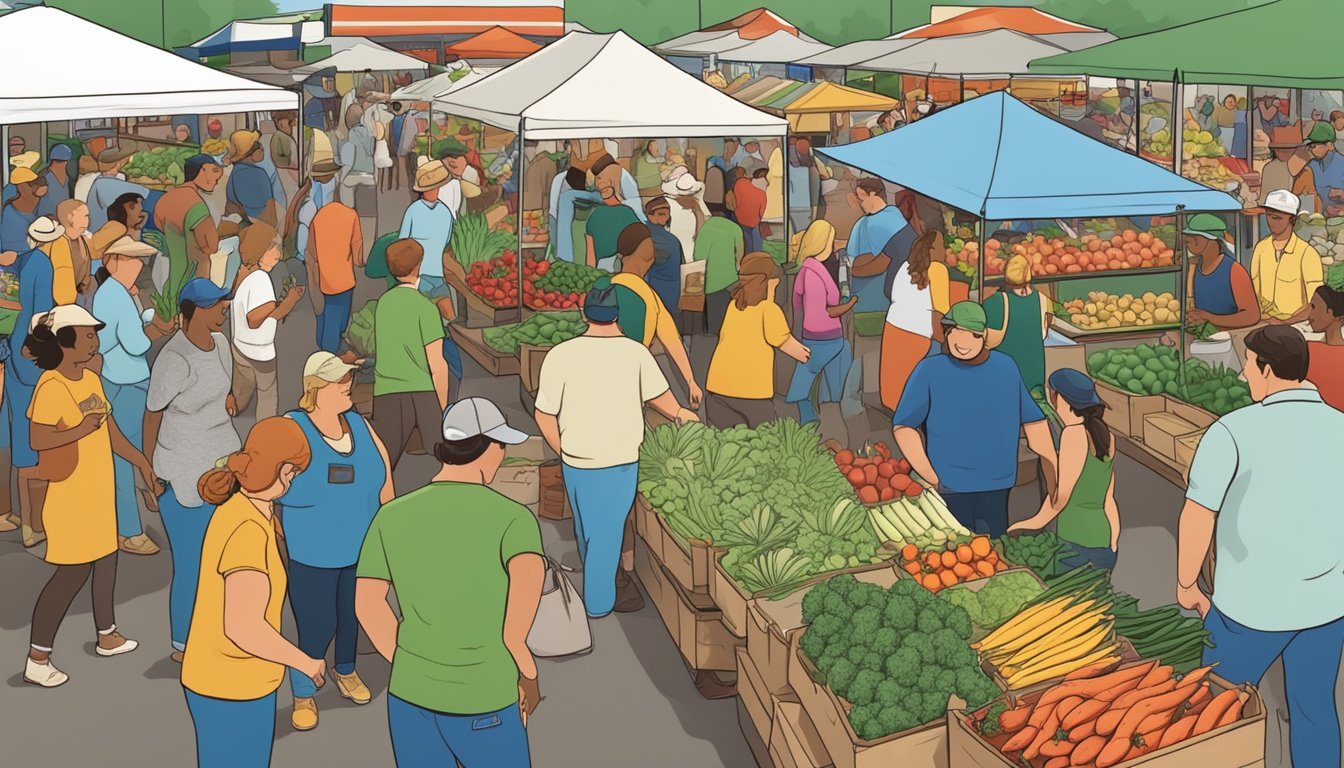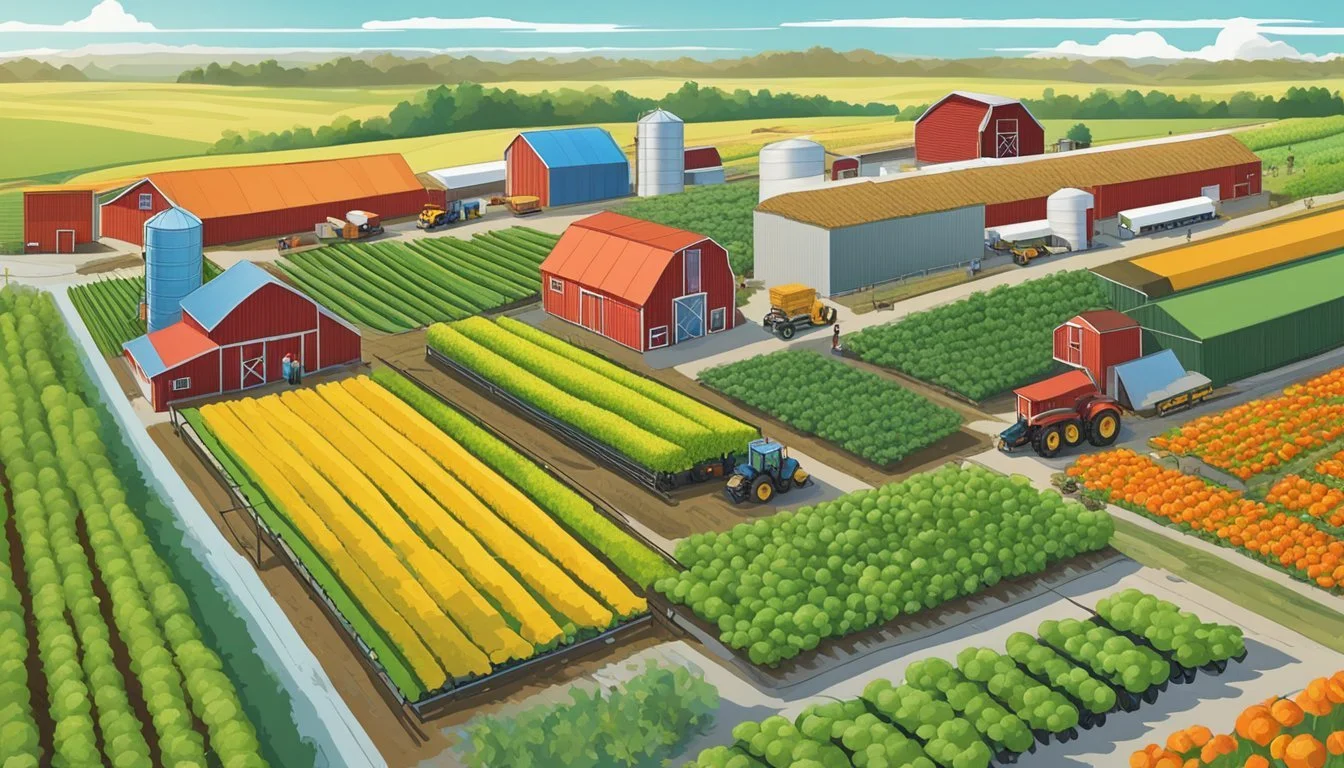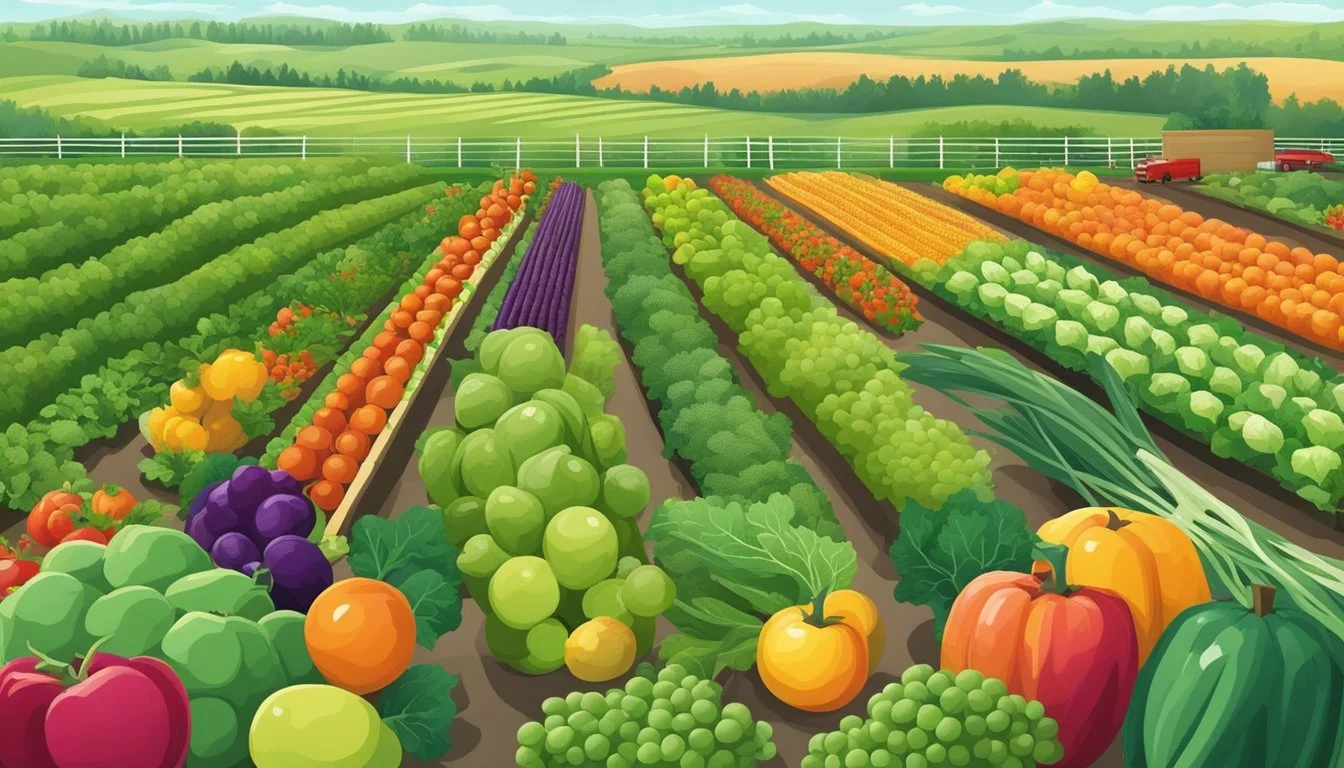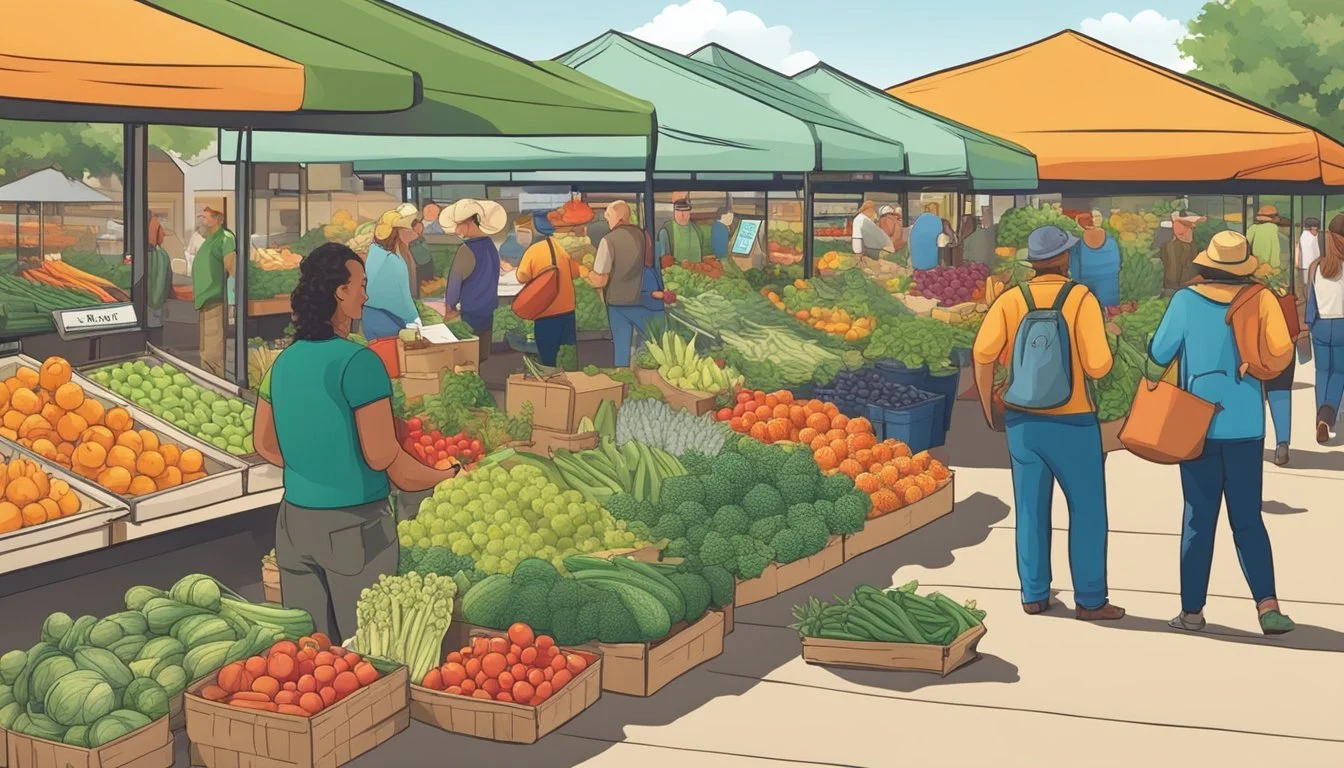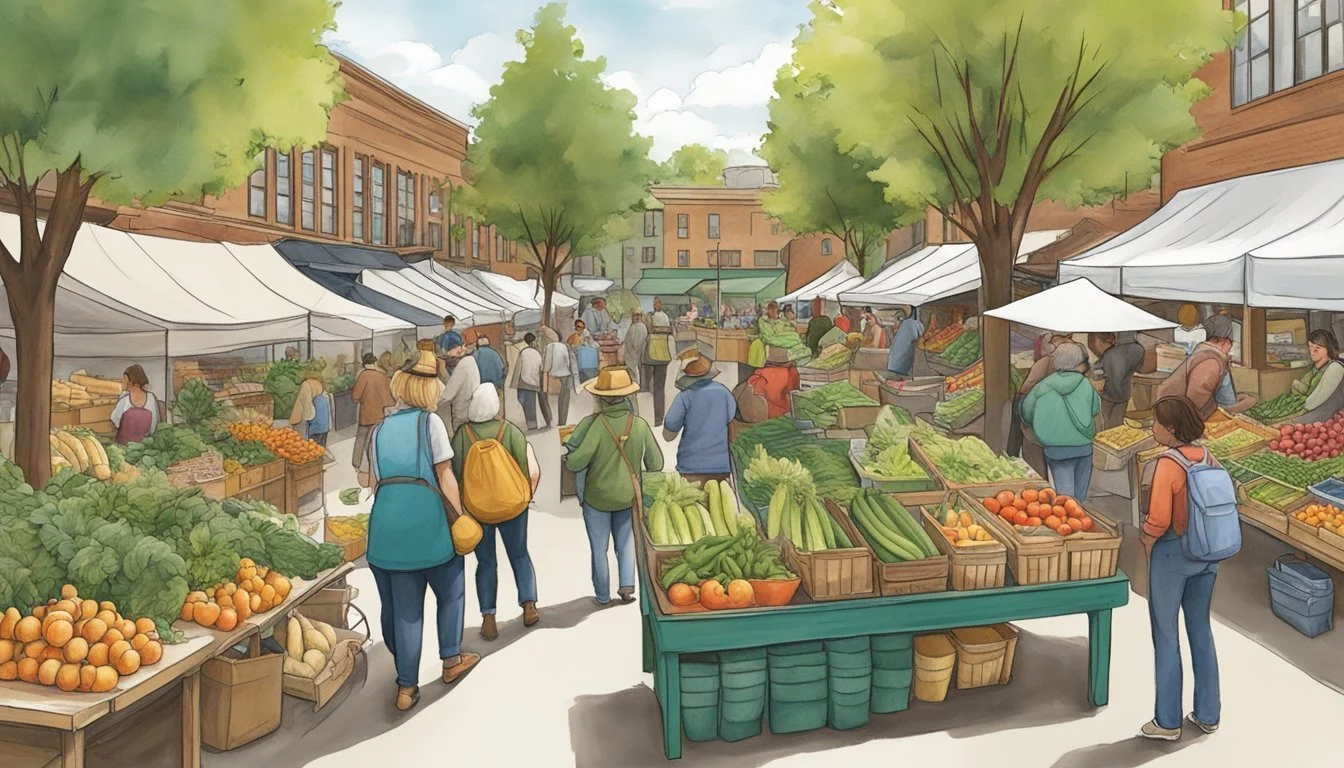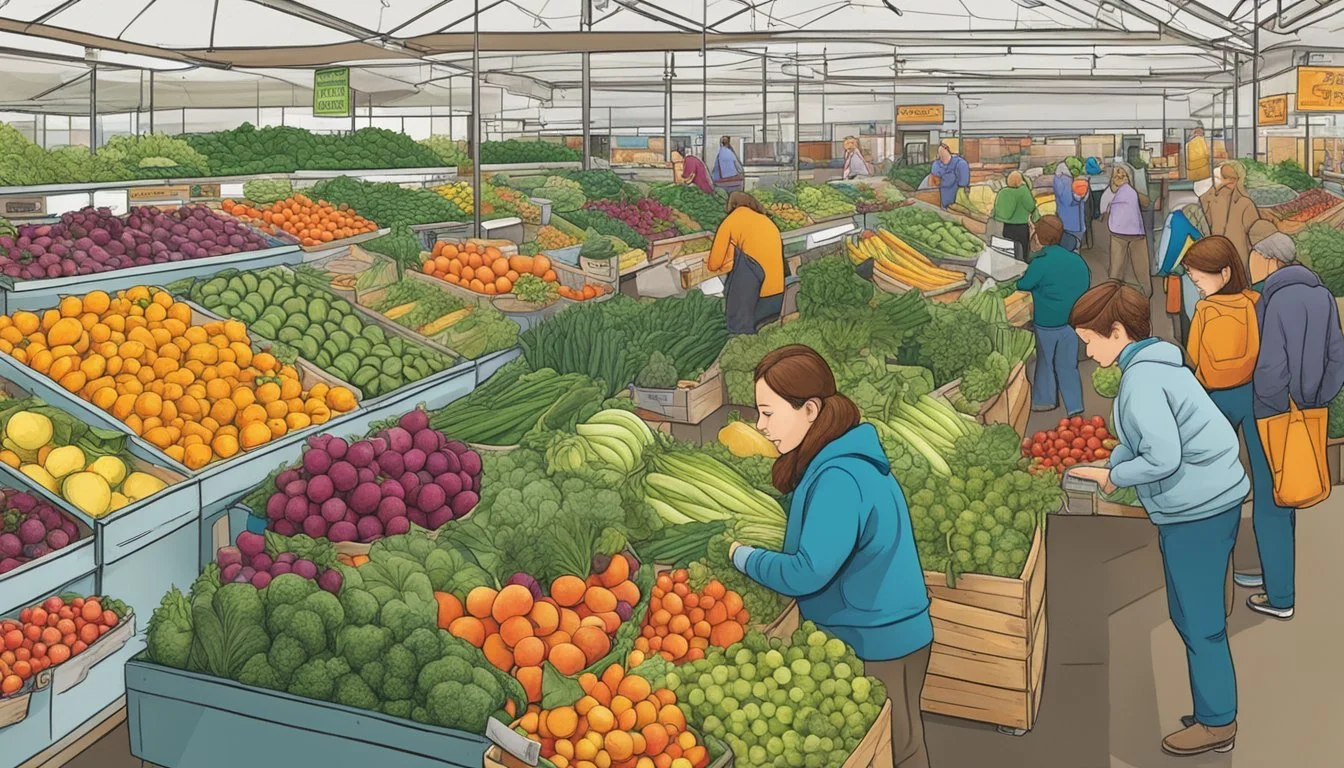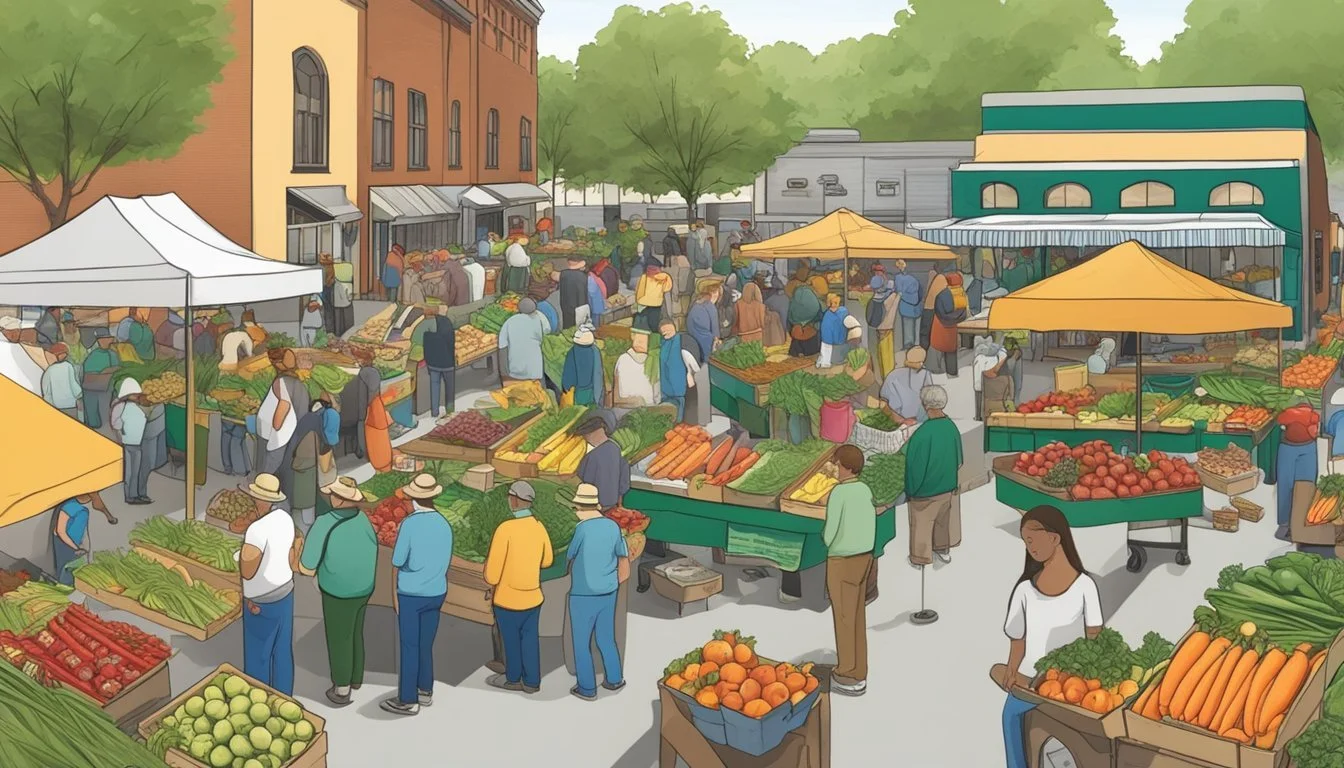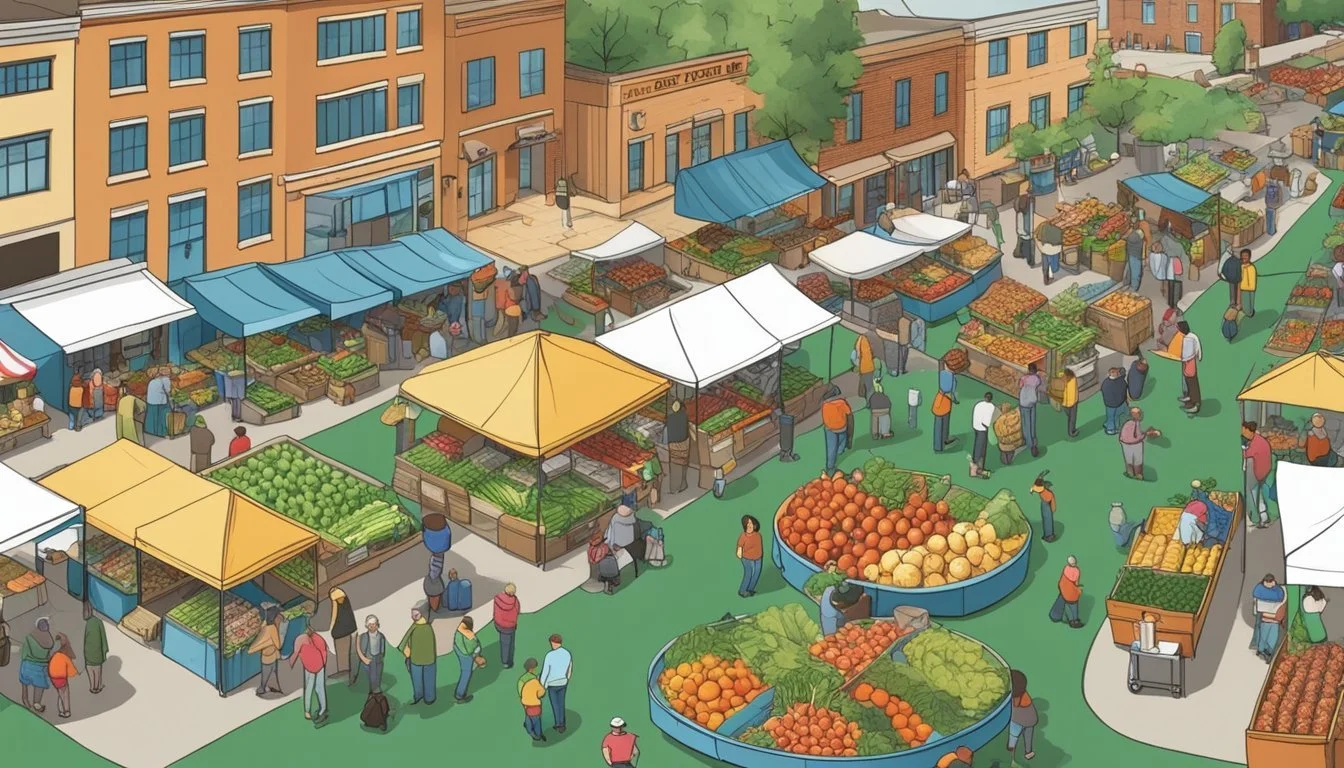Community Supported Agriculture (CSA) in Fargo, ND
Thriving Local Food Movement
Community Supported Agriculture, commonly known as CSA, is a model of food production and distribution that directly connects farmers and consumers. In Fargo, ND, this model has gained traction as a sustainable method to access fresh, locally-grown produce. Through CSA programs, consumers in Fargo subscribe to the harvest of a particular farm or group of farms, often paying for a season’s worth of produce upfront. This arrangement provides growers with stable income and lowers the financial risks of farming.
In the Fargo region, multiple CSA programs offer a variety of pick-up locations from local farms in areas like West Acres Mall parking lot and main avenues in West Fargo. Consumers enjoy the benefits of having seasonal, often organically grown, fruits and vegetables, while also contributing to the local economy and fostering a closer relationship with those who grow their food.
The success of CSAs in Fargo also speaks to a broader interest in community health and sustainability. By participating in a CSA, members in the community not only receive their regular share of the farm's yield but also engage in an agricultural approach that encourages responsible land stewardship and reduces the carbon footprint associated with long-distance food transport.
Understanding CSA
Community Supported Agriculture (CSA) represents a partnership between farmers and the local community in which individuals pre-purchase a "share" of the harvest. This model fosters a robust local food system and provides community members with regular distributions of farm-fresh products.
Each CSA operates on the essence of mutual support. The community invests in the farmer's efforts, and the farmer commits to provide a yield of locally grown produce. Here are some vital aspects of the CSA model:
Shares: Individuals buy shares of the harvest in advance. These shares are typically offered as weekly delivery or pick-up during the farming season.
Local Producers: CSA emphasizes on local farmers, directly connecting producers to consumers. It guarantees that the money spent on these shares sustains the local agricultural economy.
Benefits for Consumers: Shareholders receive fresh, seasonal food directly from their local farm, thus ensuring transparency and trust in the food they consume.
Risk Sharing: The community shares the risks associated with farming, such as poor harvests due to weather conditions. In return, they enjoy the bounty of successful seasons alongside their farmer.
Community Involvement: CSAs often encourage shareholders to visit the farm, participate in harvests, and build relationships with the farmers.
The success of a CSA fundamentally depends on the cooperative spirit between the community and the farmers. It's a symbiotic relationship that promotes health, economic stability, and sustainability in the region's food system.
Fargo, ND boasts an array of CSA programs, evidencing a strong commitment to keeping their food system communal and sustainable. These programs ensure Fargo residents have access to fresh, healthy food while supporting their local farmers and economy.
Benefits of Joining a CSA
Joining a Community Supported Agriculture (CSA) program in Fargo, ND, offers a multitude of advantages. Participants directly support local farmers, contribute to environmental sustainability, and receive high-quality, often organic, produce, resulting in health benefits.
Stronger Local Economies
By participating in a CSA, members infuse capital directly into the local economy. The upfront payment for a season's "share" provides farmers with the necessary funds to plan and operate, creating a stable income base. This financial model bolsters local agricultural businesses and can lead to job creation within the community.
Local economy boost: Direct investment in agriculture.
Job creation: Stable farmer income can lead to more local employment.
Environmental Impact
CSAs typically emphasize organic and sustainable farming practices. These methods reduce the carbon footprint by minimizing transportation distances and avoiding harmful pesticides. Moreover, the use of non-GMO seeds and promotion of biodiversity helps in maintaining the integrity of the local ecosystem.
Reduction in carbon footprint: Locally sourced produce means less transport.
Sustainable practices: Commitment to eco-friendliness with minimal chemical usage.
Health Advantages
Members of CSAs gain access to a variety of fresh, nutrient-rich fruits and vegetables. This access encourages a healthier diet and lifestyle. The produce is often picked at the peak of ripeness, ensuring maximum flavor and nutritional content.
Access to fresh produce: Regular deliveries of high-quality fruits and vegetables.
Healthier lifestyle: Integration of more fresh, organic produce into the diet.
CSA Operations in Fargo
In Fargo, ND, Community Supported Agriculture (CSA) programs connect local farmers directly with consumers, offering shares of their harvest in return for upfront subscription payments. These programs often provide a variety of crops and have specific schedules and distribution methods tailored to community needs.
Subscription Models
CSAs in Fargo generally operate on a subscription model. Participants purchase a share before the growing season, and in exchange, they receive regular boxes of farm-fresh crops. Share sizes can vary depending on the provider and can typically accommodate individuals or families.
Single Share: Suitable for individuals or couples.
Family Share: Ideal for families or those with a higher consumption of vegetables.
Harvest Schedules
The CSA harvest schedule is heavily dependent on seasonal variations and crop rotation, with most beginning in spring and ending in fall. Subscribers can expect a diversity of produce throughout the season, including staples like tomatoes, peppers, corn, and other vegetables that thrive in the Fargo region's climate. Each farm provides a projected harvest calendar that outlines:
Start and End Dates: For example, June to October.
Frequency of Harvest: Often weekly or bi-weekly pickups.
Distribution Methods
Distribution of CSA shares in Fargo is designed with flexibility and convenience in mind. Subscribers can typically choose from several distribution methods:
Farm Pickup: Subscribers visit the farm to collect their CSA box.
Delivery Service: For an added fee, some farms offer home delivery services.
Drop-off Sites: Locations such as West Acres Mall parking lot in Fargo provide centralized pickup points.
These methods ensure that fresh produce from the CSA is distributed efficiently, making it accessible for members across the Fargo area.
Participating Farms in Fargo
In Fargo, North Dakota, residents have access to a variety of CSA programs that connect them directly with local farms. These programs offer fresh produce to the community while supporting the livelihoods of local farmers.
Farm Listings
Farm in the Dell of the Red River Valley
Location: 7378 40th St. N. Moorhead, MN
Pick-up Sites:
Site A: Farm in the Dell RRV (Mondays 4-6 PM)
Site B: West Acres Farmers Market (Tuesdays, 9 a.m. - 5 p.m.)
Site C: Salem E Free Church (Thursdays, 4-6 PM)
Contact Information: Anna Sather, [email protected]
Hildebrant Farm
CSA Model: Small-scale, relationship-focused between consumer and farmer.
Sign-up: Early spring with upfront payment.
Additional farms in the area may offer CSA options and can typically be found through local resources, such as farmers markets and community bulletins.
Organic Certification
When considering CSA options, one might inquire about organic certification—a standard for farming without synthetic pesticides and fertilizers. Organic certification in Fargo, like elsewhere, requires adherence to specific criteria and is overseen by a certifying agency. Farms in Fargo offering CSA shares may choose to pursue organic certification to meet consumer demand for organic produce. It is advisable for consumers to verify organic claims by asking the farmers for their certification documentation or referring to the USDA's national organic program database.
Prospective CSA subscribers are encouraged to discuss organic practices and certification with individual farms to ensure their practices align with consumer expectations for organic produce.
Costs and Financial Considerations
When participating in Community Supported Agriculture (CSA) in Fargo, North Dakota, potential members must scrutinize share pricing and incorporate the costs into their budget planning. The expenditures associated with CSA memberships often represent pre-season financial support for farmers, while the consumers, in turn, receive a portion of the harvest throughout the growing season.
Share Pricing
Single Share: Typically suitable for an individual or a couple.
Family Share: Generally aimed at families or households with multiple adults.
Pricing for CSA shares in Fargo varies based on the size and type of share selected. As an example:
Single Share: $250 - $500 for the season
Family Share: $400 - $800 for the season
Prices may fluctuate depending on factors such as organic certification, variety of produce, and length of the CSA season.
Budget Planning
Budgeting for CSA shares encompasses anticipating regular expenses and aligning them with household financial capabilities. Shareholders should consider the following:
Initial Investment: A one-time upfront payment is often required before the season begins.
Seasonal Budgeting: The cost can be divided over the months of the harvest to understand the monthly impact.
Savings Consideration: Over time, investing in a CSA can potentially offset grocery bills by providing a steady supply of fresh produce.
Prospective CSA members should also inquire about the availability of subsidized share options, especially if financial constraints are a concern. Some CSA programs offer cost-sharing initiatives to support low-income families, enhancing food security and fostering community inclusivity.
Seasonal Variations and Adaptations
Farmers in Fargo, ND are accustomed to the seasonal ebb and flow, which dictates the types of crops they can grow and the adaptations necessary for success.
Weather Challenges
The climate in Fargo presents a variety of weather-related challenges that can impact agricultural productivity. Winter months often bring extreme cold and snow, while summer can swing to conditions of heat and humidity. To manage these fluctuations:
Corn and beans are planted in the spring when the threat of frost has passed and harvested before the first autumn freeze.
Hardy vegetables like squash and tomatoes are chosen for their ability to withstand the early onset of cooler fall temperatures.
Crop Rotation
Effective crop rotation is crucial for maintaining soil health and managing pests, directly influencing the success of seasonal harvests. For example:
Season Crops Planted Spring Corn, Beans Summer Tomatoes, Peppers, Squash
In spring, legumes such as beans can fix nitrogen in the soil, benefiting following crops.
Rotation plans often place corn in rotation after beans to utilize the improved nitrogen levels, while tomatoes, peppers, and squash are rotated on different schedules to minimize disease and optimize soil use.
Community Engagement and Events
Community Supported Agriculture (CSA) in Fargo, ND, thrives on active participation from the community, offering a variety of events and opportunities for individuals to engage with local farms and food production.
CSA Events
Events organized by CSAs in Fargo serve as a platform for shareholders and the community to connect with local farmers. These events often include farm tours, seasonal festivals, and cooking demonstrations, providing shareholders with a deeper understanding of where their food comes from and how it's grown. For instance, Farm in the Dell of the Red River Valley hosts gatherings that not only bring fresh produce to the residents of Fargo but also create a sense of togetherness amongst community members who have a vested interest in local agriculture.
Volunteer Opportunities
Volunteering with a CSA allows members of the community in Fargo to play a direct role in the success of local food production. From helping with planting and harvesting to assisting during community events, these opportunities foster an environment where volunteers can learn about sustainable farming practices. Opportunities often vary by season and the specific needs of the CSA, making it important for prospective volunteers to reach out directly to the farms, such as Hildebrant Farms or Bill Erbes Farm, for current information on how they can contribute their time and effort.
Sustainable Practices and Education
Community Supported Agriculture (CSA) in Fargo, ND emphasizes environmentally sound growing practices and strives to educate the public on sustainable agriculture. Members of the community are encouraged to make informed decisions about their food sources that contribute positively to the local ecosystem.
Organic Farming Methods
Fargo's CSAs leverage organic farming methods to maintain the health of the soil and the quality of the produce. They apply natural fertilizers and implement crop rotations to enrich the soil without the use of harmful chemicals. CSA farms in this region prioritize sustainable agriculture, ensuring that they avoid synthetic pesticides and herbicides, thereby fostering biodiversity.
No synthetic chemicals: Farms focus on natural plant health enhancers.
Crop rotations: Practicing different crop cycles to naturally enrich the soil.
Natural fertilizers: Utilization of compost and animal manure to nourish the plants.
Educational Resources
They provide extensive educational resources to both their members and the general public. This education encompasses understanding organic growing practices, the importance of sustainable agriculture, and how individuals can make an informed decision about their food.
Workshops and tours: Offer hands-on learning experiences on the farm.
Literature and online materials: Distribute information on the benefits of organic produce and sustainable farming techniques.
Community engagement: Engage with schools and local organizations to spread knowledge about the importance of sustainability in agriculture.
Consumer Experience
In Fargo, ND, Community Supported Agriculture allows consumers to directly engage with the sourcing of their food. Subscribers to CSA shares benefit from fresh, high-quality produce while providing vital feedback to farmers, ensuring a service tailored to community needs.
Feedback and Involvement
Consumers in Fargo's CSA programs play a pivotal role in shaping the service they receive. They regularly provide feedback which is crucial for farmers aiming to improve the quality of goods and overall satisfaction with the CSA shares. In contrast to the anonymity of purchasing from grocery stores, CSA members often have direct contact with the farmers, offering comments, preferences, and concerns which are acted upon to tailor the CSA services.
Instances of Feedback:
Preferences for certain types of vegetables or fruits
Requests for more variety or options in shares
Experiences with the freshness and quality of produce
Understanding Share Contents
Subscribers typically receive a mix of produce in their shares, the contents of which can vary weekly based on seasonality and harvest yields. Unlike grocery store goods with year-round availability, CSA shares invite consumers to embrace seasonal eating. The quality and types of goods provided are often detailed in newsletters or when signing up, allowing members to have clear expectations of the services offered.
Types of Goods in CSA Shares:
Fresh vegetables such as tomatoes, peppers, and corn
Seasonal fruits that are ripe for harvest
Occasionally, additional farm products like honey or eggs
Consumers benefit from understanding the shifts in share contents, as this knowledge helps to appreciate the seasonal nature and ensures they utilize the full value of the CSA services.
Future of CSA in Fargo
In Fargo, ND, Community Supported Agriculture (CSA) is poised for significant evolution, leveraging technological enhancements and consumer trends that bolster direct marketing efforts by local farms.
Trends and Projections
The landscape of CSA in Fargo is expected to reflect a growing preference among consumers for locally sourced produce. Initiatives by organizations akin to LocalHarvest have elevated consumer awareness, leading to increased demand. The principles established by Robyn Van En, a forefront advocate of CSA, continue to influence Fargo's CSA trend towards strengthened relationships between consumers and local farms. The projection is that more consumers will subscribe to CSA programs, securing their share of the harvest and supporting the local economy.
Local Farm Engagement: CSA shows potential for expansion through:
Increased variety in offered produce to retain subscriber interest
Educational programs that foster community involvement and awareness
Direct Marketing Strategies: Local farms are likely to intensify the use of:
Social media to connect with the community
Subscription management tools to streamline CSA memberships
Technological Advancements
Fargo's CSA outlook includes the integration of technology to enhance farm operations and member experiences.
Software Solutions: Anticipated adoption includes:
Platforms for management of CSA shares
Applications for real-time inventory tracking and distribution logistics
Automation Trends:
Investment in automated systems for planting and harvesting
Use of drones for crop monitoring to improve yields and reduce waste
Fargo's community-supported agriculture initiatives are aligning with modern technology, setting a path for the CSA model to be an even more vital part of the local food ecosystem.
Additional Resources
For those seeking more in-depth understanding and guidance on Community Supported Agriculture (CSA) in Fargo, ND, a variety of books, publications, and online platforms are available. These resources offer comprehensive insights into the CSA model, its local impact, and how to engage with such programs effectively.
Books and Publications
The Call of the Land: This book provides a deep dive into the CSA movement and its role in sustainable agriculture.
Community Supported Agriculture: Entering the 21st Century: A publication that outlines the evolution and future prospects of CSA, featuring insights from notable figures like Steven McFadden.
2009 Survey of Community Supported Agriculture Producers: This survey offers valuable data and analysis regarding the state of CSA programs at the time, providing a benchmark for understanding growth and changes in the sector.
Online Platforms
LocalHarvest: A directory and platform where individuals can find local CSA programs in Fargo, ND, and learn about the benefits of joining one.
CSA Across the Nation: This online resource provides a broader picture of CSA programs across the United States, offering comparisons and contextual understanding for those in Fargo observing national trends.


